Today, Liotta is a data scientist at Dan Klores Communications, a New York City-based PR firm whose clients include various sports teams. He credits his undergraduate program—the first of its kind in the nation to offer a bachelor’s degree within a sport management department—for imparting the value of data-driven decision-making. “I had a three-month internship with the Milwaukee Brewers that was transformative,” says Liotta. “The University prepared me to take on work-specific tasks, in addition to attending staff meetings and networking with industry executives. It was a dream come true.”
Liotta is part of a growing cadre of young mathematicians who analyze sports data for a living. Such number-crunching has traditionally been used by managers and coaches to measure player performance. But in the past decade, sport analytics has changed how professional and collegiate programs compete on and off the field.
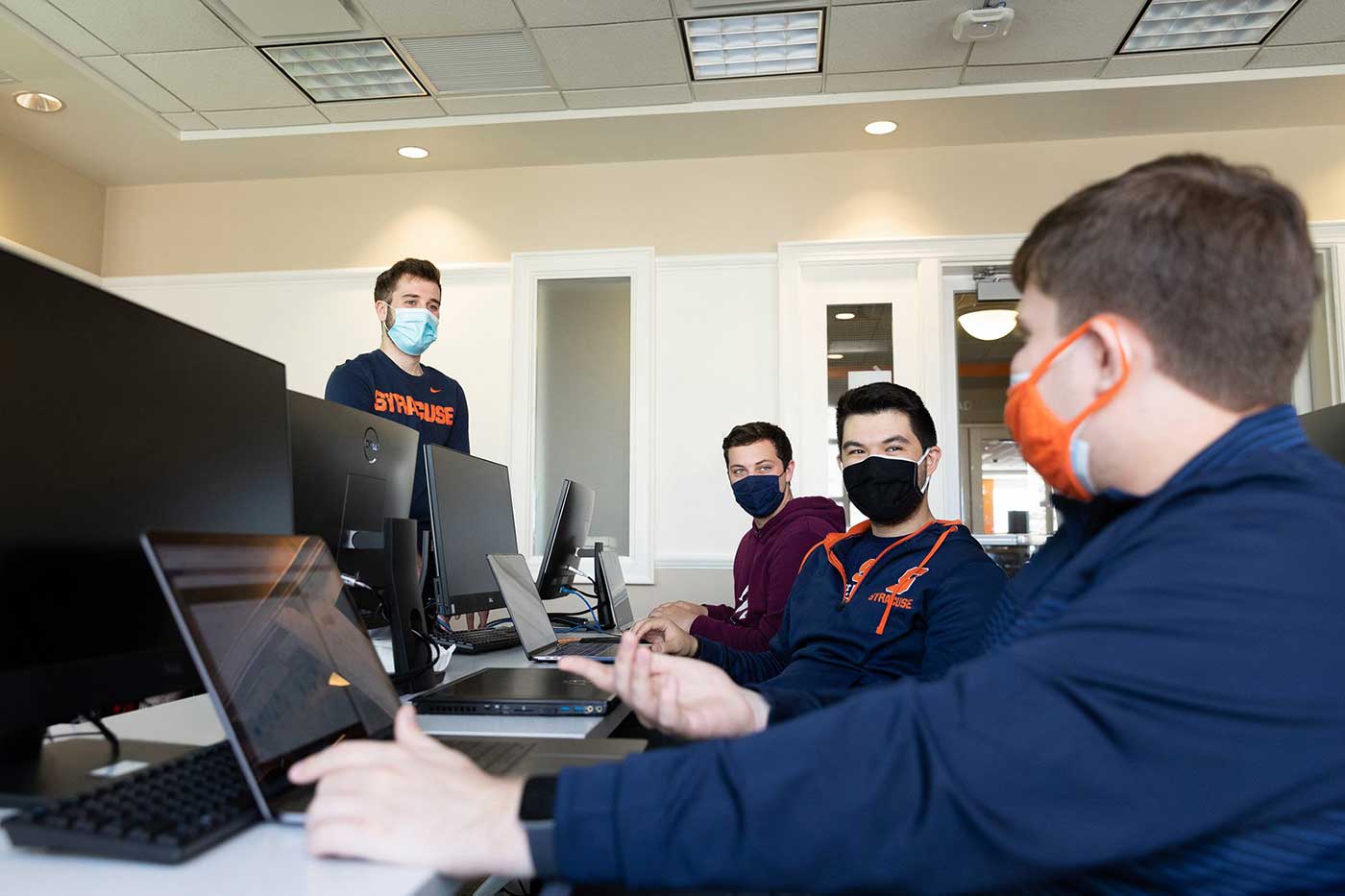
Bailie Brown ’21, the program’s first female graduate, parlayed her twin interests in analytics and data visualization into a baseball strategy apprenticeship with the Houston Astros. “Seeing there is a community of really amazing women in this industry, no matter how small, is proof I can succeed,” she says.
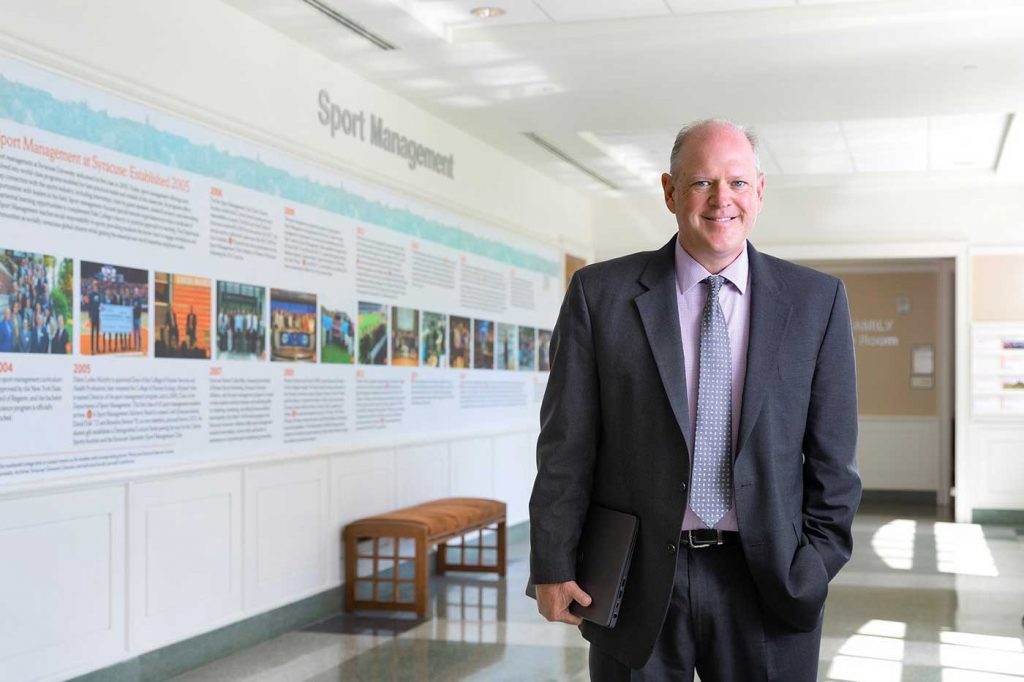
Teaming Up for Success
Paul brings a liberal arts sensibility to sport analytics, gathering courses from Falk College, the College of Arts and Sciences, the Maxwell School of Citizenship and Public Affairs, and the Martin J. Whitman School of Management. “We even require students to take a foreign language,” he says, noting the preponderance of Mandarin Chinese, Portuguese and Russian in the baseball, soccer and hockey communities. “Our program takes a forward-looking approach to sport, anticipating where it might expand next.”
Tech is integral to the experience, as evidenced by Falk’s Milton Conrad Technology Lab, which doubles as a student classroom and computer lab. Through a special arrangement with Daktronics—a global provider of video scoreboards, LED displays and timing systems—students get live, game-day production experience. “We also introduce them to wearable devices and video tracking, which provide in-depth data on player position, performance and wellness,” explains Paul, a Clemson-trained economist.
The lab includes a digital ticketing suite, where students learn how tickets are managed and purchased. “Ticketing is a key starting point for the fan-team relationship,” says Paul, adding that while paper tickets can vanish without a trace, e-tickets leave a digital trail. “It allows us to follow fan behavior, like venue entry and spending habits.” For this reason, the University’s stadium transitioned to mobile ticketing last summer.
Ticketing also is the impetus behind a bold, new partnership between sport analytics and Syracuse Athletics. Since January, more than 25 of Paul’s students have been combing through historical sales data from Syracuse football, men’s and women’s basketball, and men’s lacrosse games. Most of the work involves game-by-game and year-by-year comparisons of actual tickets scanned—information that can optimize ticket sales and the overall fan experience.
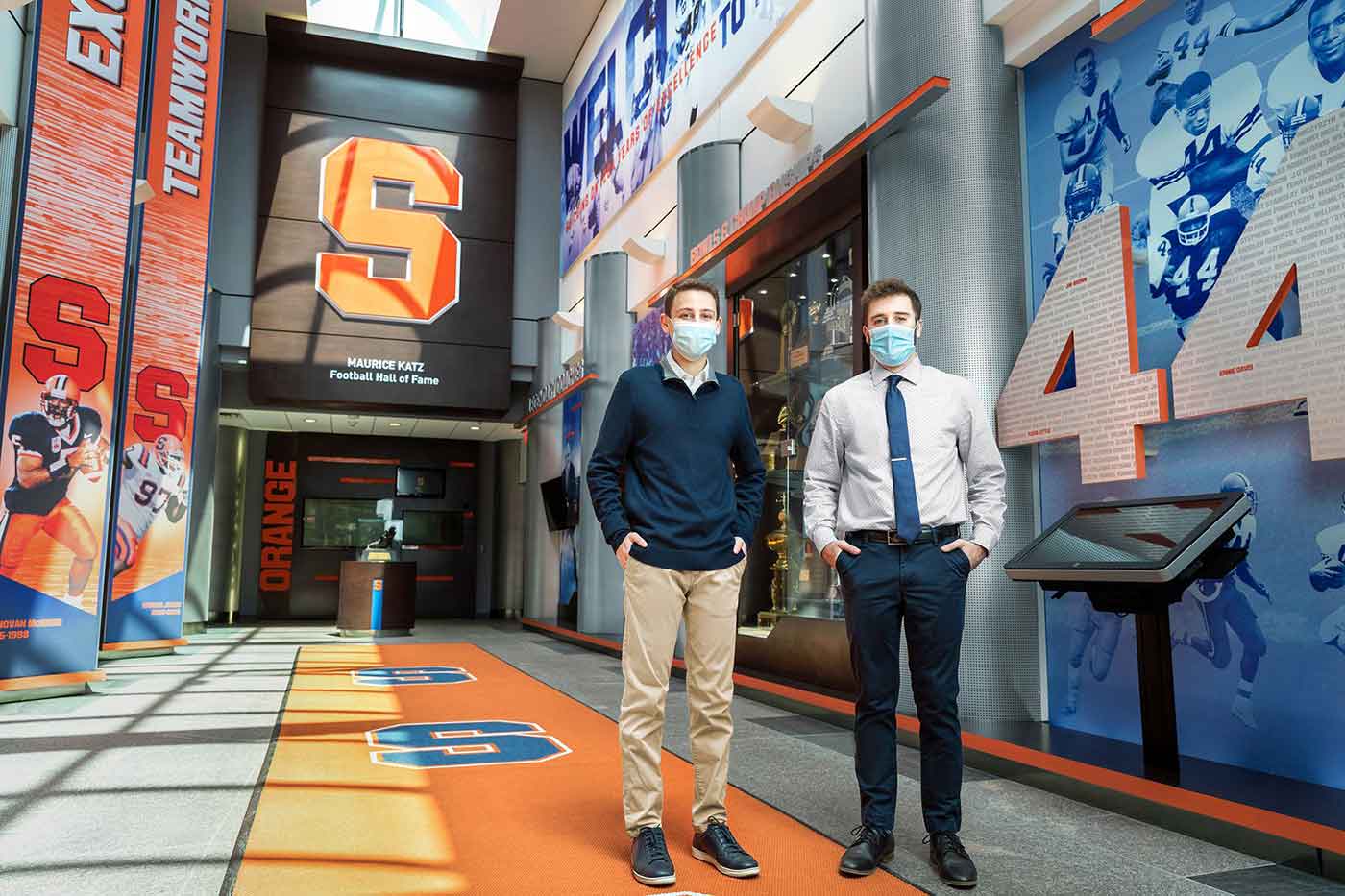
The partnership also will reveal where the University stacks up against its peers in the Power Five conferences. “I want to know where we fall in terms of ticket pricing and then determine a way to maximize sales,” says Drew DiSanto ’21, who is minoring in finance and interning as a data analyst for the Buffalo Bills. He agrees with Zak Koeppel ’21 that students bring a unique perspective to sports data. “Our impact on ticketing and pricing strategies is probably bigger than people realize,” says Koeppel, who has interned for the XFL, Bowl Season, and the EDGE10 performance and analytics group. “I want to help create a more strategic, personalized approach to fan engagement.”
Goodrich agrees, calling data the “new oil.” “Professor Paul and his students refine the information we give them, helping us determine how to better support our student-athletes via business operations and fan experiences.”
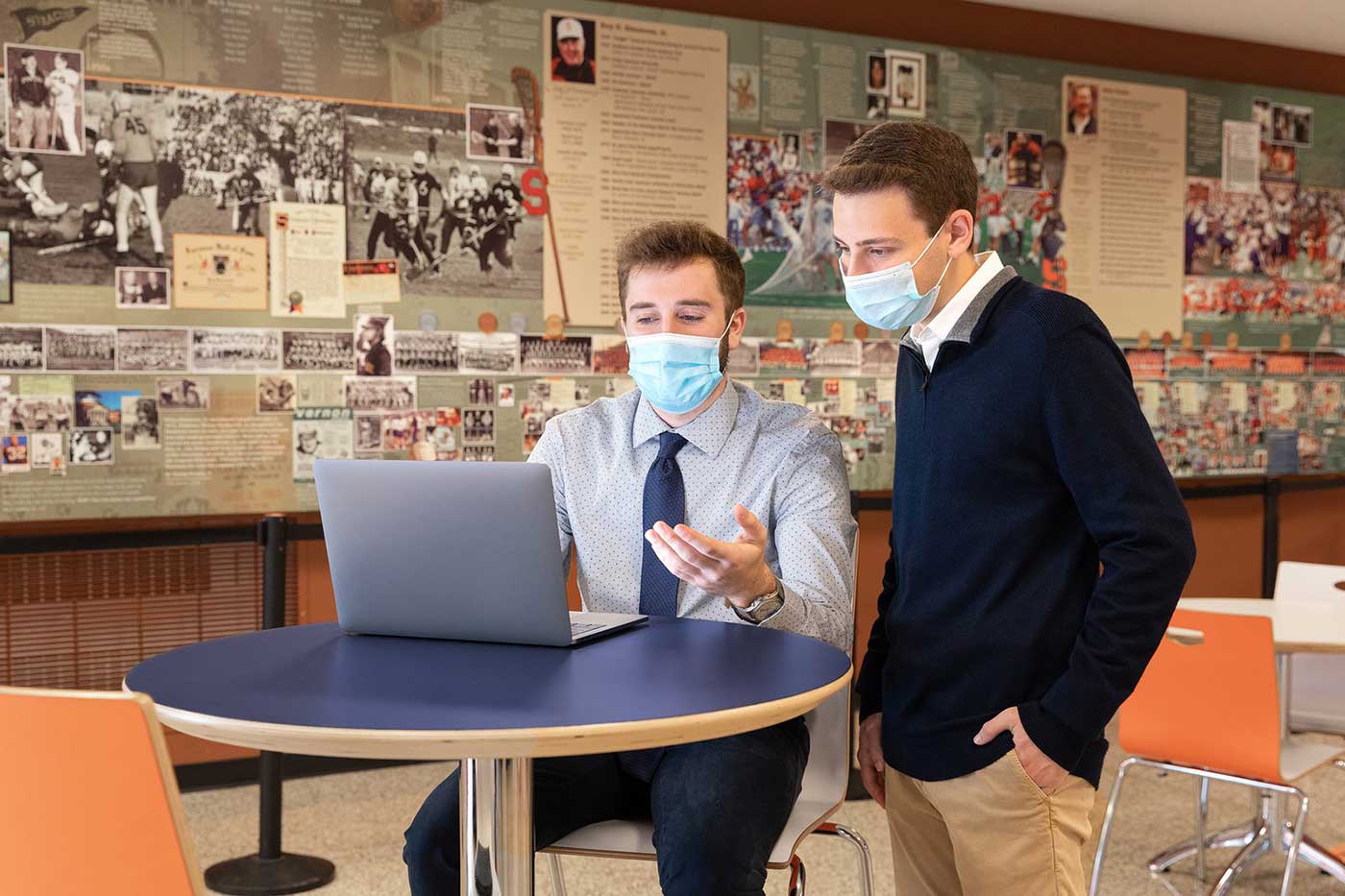
Gaining a Homefield Advantage
The seeds of the sport analytics program were sown more than a decade ago, when Paul joined the Falk College faculty. He promptly founded a SABRmetrics club—named for the Society for American Baseball Research—in response to burgeoning interest in the study and analysis of baseball performance. Think Moneyball, the 2011 biopic about the Oakland A’s general manager who turned to analyzing objective statistics (e.g., ERAs, home runs and RBIs) to revive his slumping franchise. “SABRmetrics has revolutionized the entire sport industry. It’s all about equations and formulas,” Paul says. “The data gets pretty granular.”
Paul found this out firsthand in 2014, when he co-published a study about the impact of air density on the speed of pitching and pitch selection. His findings not only caught the attention of the MIT Sloan Sports Analytics Conference, but also were picked up by ESPN The Magazine. “That’s when I began thinking about how sport data could be rolled into a single undergraduate degree program, which hadn’t been done yet,” he says.
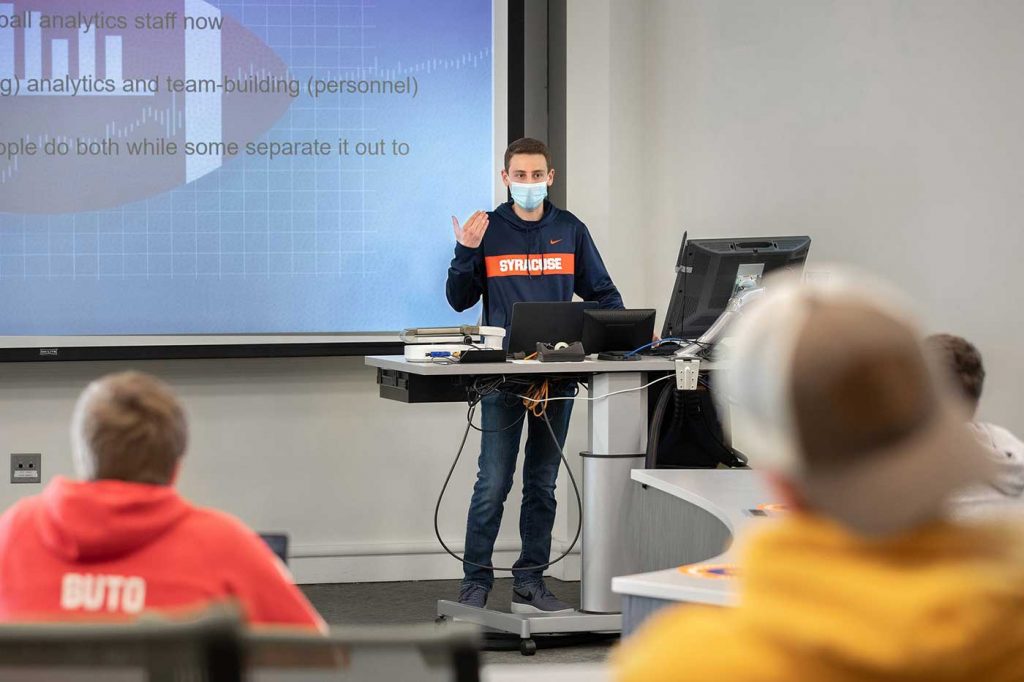
Tommy Powell G’20, assistant provost for student-athlete academic development, believes data and analytics are the future of sports and business, in general. “Our partnership with sport analytics not only helps sales and operations, but also makes our students more competitive after graduation,” he says. Case in point: DiSanto, who graduates in December, has been accepted into the applied data science master’s degree program in the School of Information Studies.
Cody Barbuto ’19 is a testament to the degree’s versatility. As a student, he became known for co-publishing trade articles and speaking at conferences. At one point, he even traveled to Orlando to address the NCAA’s Ad Hoc Committee on Sports Wagering, then chaired by Chancellor Syverud.
Today, Barbuto is a data analyst for Syracuse-based United Auto Supply, a wholesale distributor of auto and heavy-duty fleet parts. “I help managers and stakeholders make informed decisions,” he says, noting the similarities between the sport and automotive industries. “I love sports, but I also love doing new and different things. I use my sport analytics degree every day to be successful.”
A Syracuse University story by Rob Enslin originally published on August 26, 2021.
